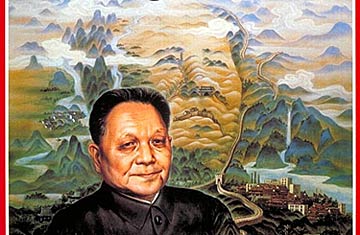
(8 of 20)
This political insanity was put in context during a talk I had with Hu Qiaomu. Slow in speech, broad of nose, gray of hair, Hu had been a Shanghai intellectual in the '30s who trekked north to Yanan and became Mao's private secretary, worked with Deng Xiaoping, rose until 1966 when he, too, was purged.
"They put me through the jet," he said, then abruptly halted. A man put through the jet was forced to crouch motionless for hours or days, his head down and outstretched like the nose of a jet, his arms extended behind him like its wings. While Red Guards changed hourly, the victim crouched and answered questions. Some collapsed, some died. Hu survived but is a frail and melancholy man.
I wanted to question him on his authorship of the confession of error, the official history of the Communist Party, approved by the Zhongyang in June 1981. The structure and thinking, he insisted, were that of Deng Xiaoping; the document was a party document, not his alone.
"How did Mao make those mistakes? I asked. After the revolution, Hu replied, it proved more difficult to establish socialism than it had been to overthrow the old regime. Differences between the leadership grew. The old brotherhood began to split with collectivization in 1958 — a disaster. "Mao knew he had been wrong in the Great Leap Forward," said Hu Qiaomu. But when Peng Dehuai circulated a critical letter, Hu went on, he "was scraping at a wound which, left to itself, might heal. To scrape a man with a healing wound rouses all his irritations, angers him." So Mao got rid of Peng — first to go of the old guard.
Add to the pressures not only Mao's isolation but his growing distrust of the Soviet Union. "Mao's visits to Russia were not only very short but very unpleasant, " said Hu. Mao believed that the Soviets had bureaucratized their revolution, had betrayed Marxism, were traitors to Communism — revisionists! If the Soviets had succumbed to bureaucracy, might not the same thing happen in China? Thus, a growing suspicion that revisionism and class enemies might be infecting even his own party. On went Hu, describing the paranoia growing. Mao had disliked intellectuals ever since he had been a $30-a-month librarian in Peking in his youth. "The more knowledge you give the people," said Mao, "the more you hold back revolutionary thought." Or, "The more books people read, the more foolish they become." So Mao let loose the Cultural Revolution, but, said Hu, "once he let the genie out of the bottle, he could not put it back in."
I tried to bring Hu to personalities. Peng had been too proud and stubborn, he said. Lin Biao had been too ambitious, a careerist, sucking up to Mao, then trying to kill him. Finally he came to Jiang Qing. Here Hu's anger burst. "If you were to write a biography of Mao, she would be the tragedy of his life." Then, an anecdote about Jiang Qing escorting Imelda Marcos, the First Lady of the Philippines, on a visit to Tianjin. The state cavalcade roared through the peasants, ran one down and killed him. Stop, said Imelda. No, said Jiang Qing, drive on! The cavalcade drove on.
Did Mao know of the horrors? Both Peng Dehuai and Liu Shaoqi had lived so close to Mao below the ledge in the Date
